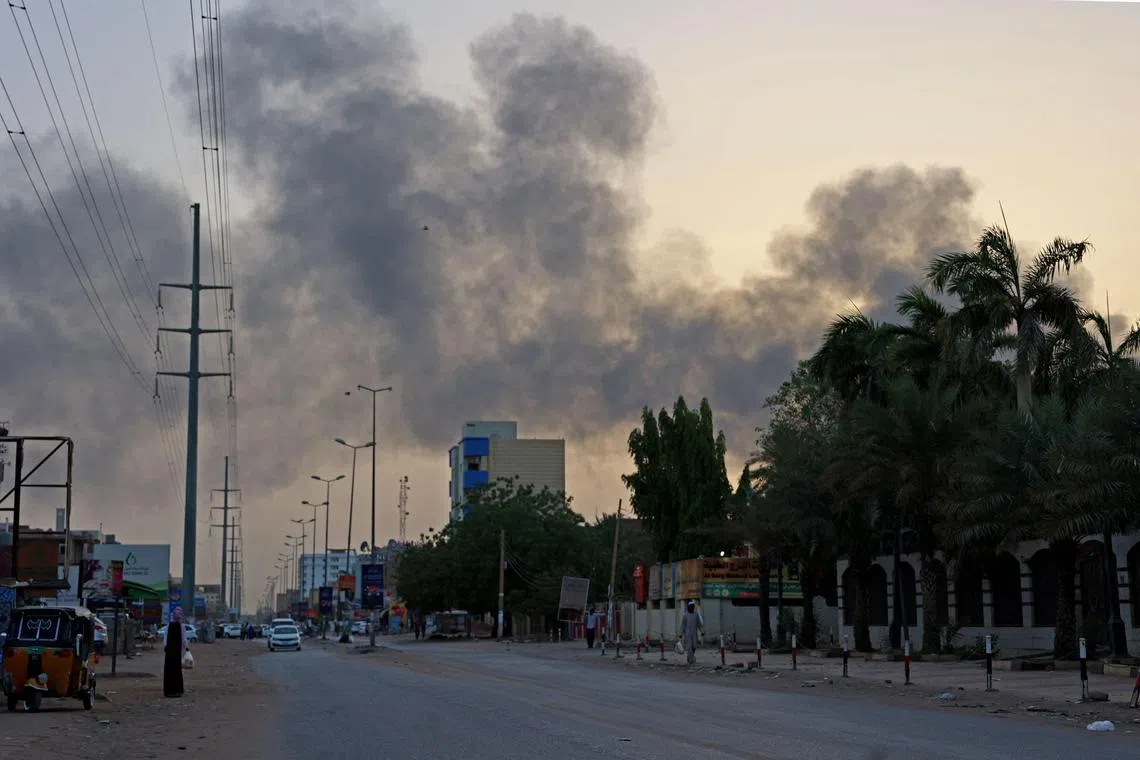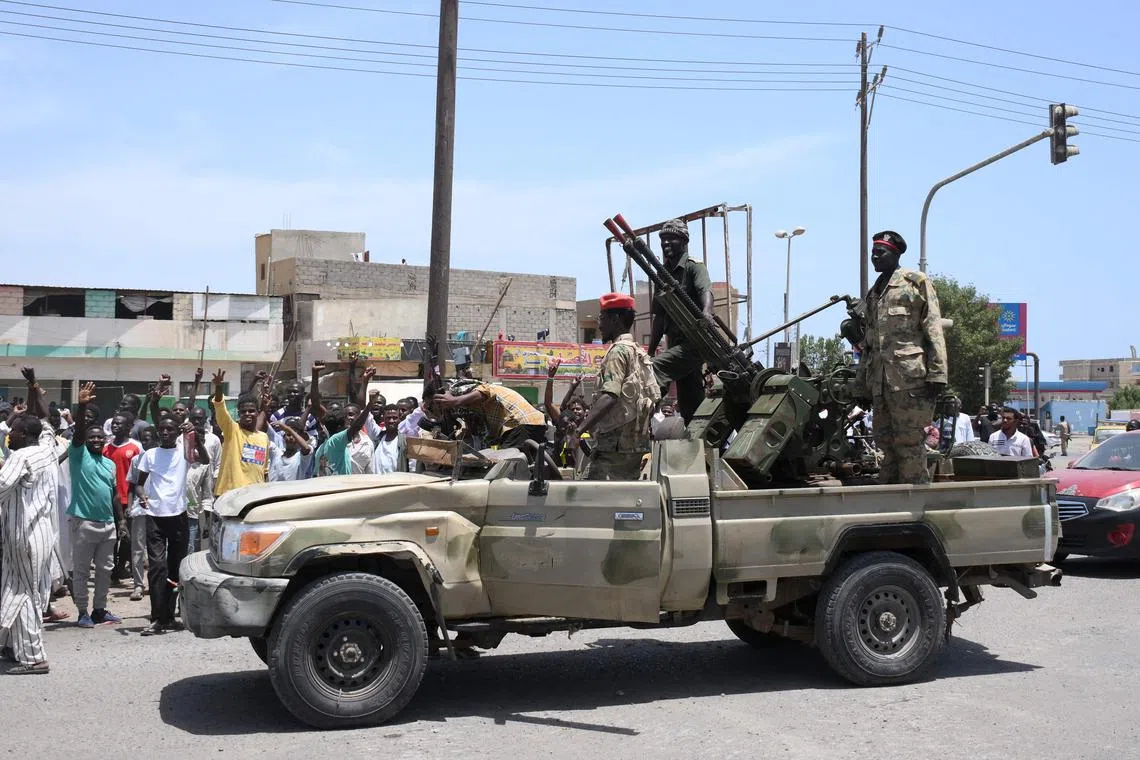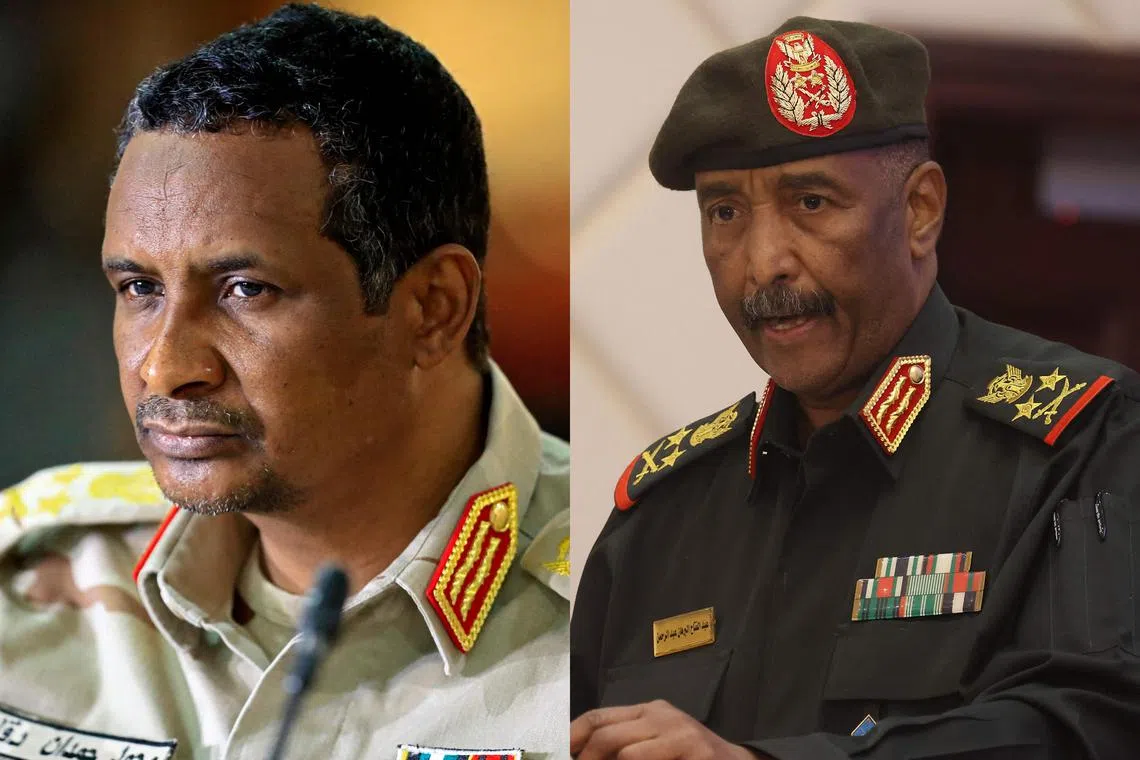What’s behind the fighting in Sudan and what does it mean?
Sign up now: Get ST's newsletters delivered to your inbox

Smoke billowing above residential buildings in east Khartoum, as fighting in Sudan raged for a second day in battles between rival generals.
PHOTO: AFP
KHARTOUM - A long-simmering dispute in Sudan between the army and a rival paramilitary group
Dozens of people were reported dead and hundreds injured, with fears mounting that the clashes could lead to a civil war and draw in regional powers.
The violence upended plans for a power-sharing government that was set to pave the way for democratic elections and potentially restore billions of dollars of frozen foreign aid.
Progress was being closely watched by Western powers as well as Russia and China, which both have interests in Sudan’s strategic Red Sea coastline and mineral resources.
How did it come to this?
Sudan’s military has long been the country’s pre-eminent power broker.
It propped up dictator Omar al-Bashir for three decades before ousting him in 2019 after months of protests against runaway inflation and state brutality.
Then in 2021, the army led by Lieutenant-General Abdel Fattah al-Burhan toppled the uneasy transitional coalition of civilian and military figures that had run the nation after the popular uprising.
The coup sparked unrest and a deadly crackdown by security forces, dashing hopes for a speedy transition to democracy.
With the generals in near-total control, a long-running rivalry came to the fore between the military and a powerful militia known as the Rapid Support Forces (RSF), which had helped overthrow Bashir.
Who are the Rapid Support Forces?
The RSF has origins in the government-backed Janjaweed militias that terrorised Sudan’s western region of Darfur during fighting there in the early 2000s, and is led by one-time camel trader Mohamed Hamdan Dagalo.
A former enforcer for Bashir, Mr Dagalo helped overthrow him in 2019 and became deputy of the quasi-presidential Sovereign Council, basically Sudan’s second-in-command.
While lacking air power and tanks, the RSF is a seasoned fighting force that has waged counter-insurgencies for years and played a part in the Saudi Arabia-led war against Houthi rebels in Yemen.
It may number as many as 70,000 fighters, according to the International Crisis Group.
Under the army’s proposed power-sharing pact, the RSF – which has its own command structure, wealth and commercial interests – would have been folded into the regular military, losing its independence.
That would have been a bitter blow for Mr Dagalo, who is thought to harbour presidential ambitions and has forged close ties with Russia in recent years.
How widespread is the conflict?
Fighting has engulfed parts of Khartoum, the capital, and there has been violence in several other cities across Sudan, including Nyala and el-Fasher in Darfur, as well as in Blue Nile state bordering Ethiopia.
Both sides have claimed to control key infrastructure such as the international airport and public broadcaster, and their statements give no sign of let-up, stoking fears of a full-blown civil war.
The United Nations Security Council has urged parties to stop hostilities and the US, Russia and China have also pushed for a ceasefire.
The two sides agreed to a temporary pause in fighting on Sunday evening, though shooting continued to be heard in Khartoum.
What are the international stakes?
Under Bashir, who seized power in 1989, Sudan became isolated on the international stage.
He spearheaded an Islamist revolution that for a time in the 1990s turned Sudan into a haven for terrorists such as Osama bin Laden.
He was later indicted by the International Criminal Court for alleged war crimes and genocide in Darfur.
After his ouster, the US rescinded its three-decade listing of Sudan as a sponsor of terrorism and it was gradually re-embraced by Western countries, which saw in it a potential new ally in Africa as well as an example for democratisation in the broader Middle East and the Horn of Africa.
They faced competition from China, which has backed port and rail projects, and Russia as it continued a tactic of building influence among the leadership of weaker African states.
The Russian mercenary Wagner Group is involved in Sudan’s gold-mining sector.
What about for Africa?
The violence is the latest in a string of setbacks to democracy in Africa, following recent coups in Mali and Burkina Faso.
A prolonged conflict in a country that has seen countless insurgencies in its decades of independence could draw in Sudan’s neighbours, whether directly or through the backing of proxy forces, with potentially grave implications for regional security and risking the lives of millions.

Sudanese greeting army soldiers, loyal to army chief Abdel Fattah al-Burhan, in the Red Sea city of Port Sudan on April 16, 2023.
PHOTO: AFP
It could also further complicate talks aimed at resolving a stand-off over the filling of a giant hydropower dam that Ethiopia is building on a tributary of the Nile River and which threatens to interrupt the water supply downstream in Egypt and Sudan.
What are Sudan’s economic challenges?
A 2005 peace deal that ended a two-decade civil war led, six years later, to the partitioning of the country into Sudan and a newly formed South Sudan.
The new nation to the south took control over three-quarters of oil reserves, stripping the north of a large chunk of its revenue and foreign exchange.

Rapid Support Forces commander Mohamed Hamdan Dagalo (left) and Sudan‘s Army chief Abdel Fattah al-Burhan are at the heart of a full-blown battle for control of Sudan.
PHOTOS: AFP
The Sudanese government tried to diversify the economy by encouraging mining, but it remains a fledgling industry and the bulk of the country’s 45 million people depend on subsistence agriculture.
After Bashir’s ouster, institutions such as the World Bank and International Monetary Fund discussed renewed support, and its transitional rulers tried to secure Western investment.
The 2021 putsch derailed that, prompting many donors to withhold budget support and leaving the military-led government scrabbling to cover a funding gap.
Sudan is already among the world’s poorest nations, ranking 170th out of 189 countries on the UN Development Programme’s Human Development Index. BLOOMBERG


